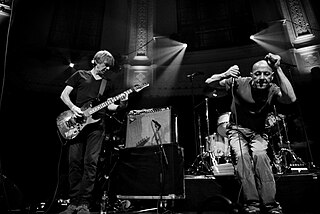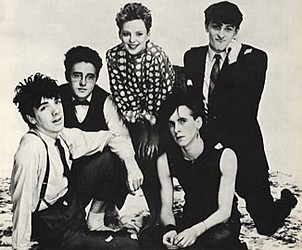
The Associates were a Scottish post-punk and pop band, formed in Dundee in 1979 by lead vocalist Billy Mackenzie and guitarist Alan Rankine. The band released an unauthorized cover version of David Bowie's "Boys Keep Swinging" as their debut single in 1979, which landed them a recording contract with Fiction Records. They followed with their debut studio album The Affectionate Punch in 1980 and the compilation album Fourth Drawer Down in 1981, both to critical praise.

Simple Minds are a Scottish rock band formed in Glasgow in 1977, becoming best known internationally for their song "Don't You " (1985), which topped the Billboard Hot 100 in the United States. Other commercially successful singles include "Promised You a Miracle" (1982), "Glittering Prize" (1982), "Someone Somewhere in Summertime" (1982), "Waterfront" (1983), "Alive and Kicking" (1985), "Sanctify Yourself" (1986), "Let There Be Love" (1991), "She's a River" (1995), and the UK number one single "Belfast Child" (1989).

ABC are an English pop band that originated in Sheffield in 1980, evolving from the earlier ensemble Vice Versa. The band's classic formation featured Martin Fry as the lead vocalist, Mark White on guitar and keyboards, Stephen Singleton playing the saxophone, and David Palmer behind the drums.

Bis are a Scottish indie pop band composed of Steven Clark, John Clark, and Amanda MacKinnon, formed in 1994. The band's name, rhyming with 'this', derives from "black iron skyline", a lyric from the song "Twilight of a Champion" by The The.

Dead or Alive were an English pop band who released seven studio albums from 1984 to 2000. The band formed in 1980 in Liverpool and found success in the mid-1980s, releasing seven singles that made the UK Top 40 and three albums in the UK Top 30. At the peak of their success, the line-up consisted of Pete Burns (vocals), Steve Coy (drums), Mike Percy (bass), and Tim Lever (keyboards), with the core pair of Burns and Coy writing and producing for the remainder of the band's career due to Percy and Lever exiting the group in 1988. Burns died in 2016; with the death of Coy in 2018, the band ended.

Shriekback are an English rock band formed in 1981 in Kentish Town by Barry Andrews, formerly of XTC and the League of Gentlemen (keyboards/synthesizers/vocals), and Dave Allen, formerly of Gang of Four, with Carl Marsh, formerly of Out on Blue Six (guitars/vocals) soon added to the line-up. The band's early music was a funk-influenced version of new wave and post-punk, later moving towards art rock and always featuring "insidiously weird vocals".

The Motors were a British pub rock band formed in London in 1977 by former Ducks Deluxe members Nick Garvey and Andy McMaster together with guitarist Rob Hendry and drummer Ricky Slaughter. Their biggest success was with the McMaster-penned song "Airport", a number 4 UK hit single in 1978.
Urusei Yatsura were a Scottish rock band formed in Glasgow in 1993.

China Crisis are an English new wave and synth-pop band formed in Kirkby, near Liverpool, Merseyside in 1979 with a core of lead vocalist/keyboardist Gary Daly and guitarist/vocalist Eddie Lundon. Initially a politically charged post-punk band influenced by Brian Eno's ambient soundscapes, China Crisis soon crossed over to a more commercial sound and had success in the United Kingdom in the 1980s with ten top-50 singles, including the top-10 hit "Wishful Thinking", and three albums charting in or just outside the top 20, including Working with Fire and Steel and the top-10 entry Flaunt the Imperfection, that both received a gold certification.

Strawberry Switchblade were a Scottish pop duo formed in Glasgow in 1981 by Jill Bryson and Rose McDowall, best known for their song "Since Yesterday" from 1985, and their flamboyant clothing with bows and polka-dots.

The Professionals were an English punk rock band active from 1979 to early 1982 and again from 2015 to 2024. They were formed by ex-Sex Pistols members Steve Jones and Paul Cook after that band's demise. The Professionals split in 1982, before reforming in 2015 under the leadership of Cook.
Finitribe were a Scottish electronic music group. The group was originally referred to as Fini Tribe. The name was taken from finny tribe, a term used by the Rosicrucians to describe the fishes.

Altered Images is a Scottish new wave/post-punk band who found success in the early 1980s. Fronted by singer Clare Grogan, the group branched into mainstream pop music, having six UK top-40 hit singles and three top-30 albums from 1981 to 1983. Their hits include "Happy Birthday", "I Could Be Happy", "See Those Eyes", and "Don't Talk to Me About Love".

New Gold Dream (81–82–83–84) is the fifth studio album by Scottish band Simple Minds. The album was released in September 1982 by record label Virgin. It is considered one of the defining albums of the new pop movement of the early 1980s. It spawned the commercially successful singles “Promised You a Miracle” released in April 1982, “Glittering Prize” released in August 1982, and “Someone Somewhere in Summertime” released in November 1982. The albums title track, "New Gold Dream (81–82–83–84)", saw a limited release in Italy in March 1983 following the band's Italian leg of their supporting tour.
Adrian Israel Gurvitz is an English singer, songwriter, musician and record producer. His prolific songwriting ability has gained him hits with Eddie Money's No. 1 Billboard Mainstream Rock hit "The Love in Your Eyes" and with his own song "Classic", a No. 8 UK hit single, as well as the top 10 UK Rock Chart single "Race with the Devil", with his band the Gun. He also co-wrote the track "Even If My Heart Would Break" from the Grammy Award-winning soundtrack The Bodyguard. His early bands the Gun, Three Man Army and the Baker Gurvitz Army were major influences to the first wave of the British hard rock circuit. Gurvitz also gained notability as a lead guitarist, known for his intricate, hard-driving solos. Gurvitz was placed at No. 9 by Chris Welch of Melody Maker’s "Best Guitarists in the World" list.
Brian Alexander Robertson is a Scottish musician, composer and songwriter. He had a string of hits in the late 1970s and early 1980s characterised by catchy pop tunes and jaunty humorous lyrics, including "Kool in the Kaftan", Knocked It Off", "To Be or Not to Be" and "Bang Bang", a tongue-in-cheek commentary on famous historical and fictional couples. He wrote with Mike Rutherford of Genesis the Grammy-nominated and Ivor Novello Award-winning "The Living Years". It was a number one hit in the US, Canada, Australia and Ireland and reached number 2 in his native UK. He has also written music for films and been a television presenter.
Blue are a Scottish pop rock band, formed in Glasgow in 1973. The band currently consists of Hughie Nicholson, Ian MacMillan and David Nicholson.

"Waterfront" is a song by Scottish rock band Simple Minds, the first single–released in November 1983–taken from their (then-to-come) sixth studio album, Sparkle in the Rain.

Sparkle in the Rain is the sixth studio album by Scottish rock band Simple Minds, released on 6 February 1984 by record label Virgin in the UK and A&M in the US.
Berlin Blondes were a new wave/synth-pop group from Glasgow which formed in 1978. They released an album in 1980 on the label EMI.













